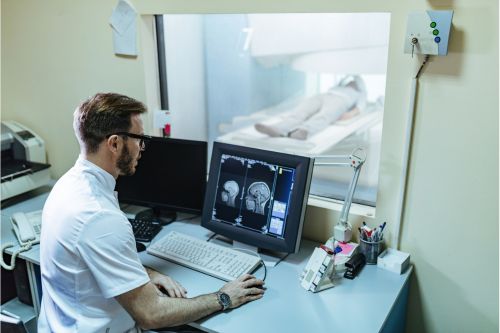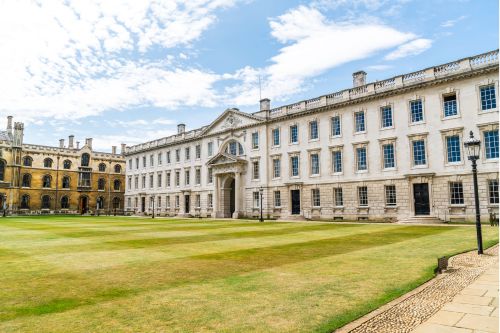Table of Contents
About radiology
In 1895, Wilhelm Conrad Röntgen invented an energized, lightproof cathode ray tube that began to glow when placed a few feet away from a screen painted with fluorescent material. He was aware that the screen was reacting to unknown rays broadcast throughout the room, which he referred to as ‘x-rays.’ Following Röntgen’s discovery, people began producing radiographic images, which started with a burst of ionizing radiation and resulted in a contrasting print on a piece of film. Diagnostic imaging, also referred to as radiology, involves a series of tests that capture images or photographs of different parts of the body. The field has two branches- diagnostic and interventional radiology, which use radiant energy to detect and cure disorders. Before moving on to the top universities to pursue radiology in the UK, let’s find out why it is essential in healthcare.
Why is radiology important?
Hospitals use radiology in every aspect of health care, including-
- Surgery
- Pediatrics
- Obstetrics
- Oncology
- Trauma-response
- Emergency medicine
- Infectious disease
In many circumstances, early detection can save lives, especially those of cancer patients. Without diagnostic imaging, family doctors and emergency care physicians cannot successfully manage patients, so they rely on radiology to determine the correct diagnosis and course of therapy.
Why study radiology in the UK?

Studying radiology in the UK offers world-class education and access to state-of-the-art imaging facilities. It prepares students for various career opportunities.
Best universities for radiography UK
The UK boasts several top-tier academic institutions. It includes University College London, Imperial College London, the University of Oxford, and the University of Cambridge, each with a long-standing tradition of excellence in radiology education and research.
Research
Students studying radiology in the UK can work with renowned faculty members who are leading experts in the field and actively contribute to research and clinical practice. The UK’s cutting-edge research in cancer imaging, neuroimaging, and cardiac imaging has significantly contributed to the advancement of radiology worldwide.
Job prospects
The UK offers a highly competitive job market for radiologists, with a high demand for qualified private and public professionals. Graduates in the UK radiology programs can expect to earn highly competitive salaries and enjoy professional growth and development opportunities.
Top universities to pursue Radiology in the UK

University College London (UCL)
- Best Universities for Radiology, Nuclear Medicine, and Medical Imaging- 3rd
- Best Global Universities- 12th
It is a world-renowned radiology education, research, and innovation institution. Its Department of Medical Imaging provides a comprehensive training program for aspiring radiologists with the latest technology and state-of-the-art facilities. UCL’s curriculum provides students with a broad understanding of radiology principles and the practical skills necessary for diagnosing and treating various medical conditions.
The faculty comprises leading experts who actively contribute to advancing radiology through research and clinical practice. UCL’s commitment to excellence in radiology education and research makes it an ideal destination for anyone seeking a career in this dynamic and rapidly evolving field and makes it one of the best universities with radiology programs.
Imperial College London
- Best Universities for Radiology, Nuclear Medicine, and Medical Imaging- 6th
- Best Global Universities- 13th
The college is a top-tier academic institution with a long-standing radiology excellence tradition. Its Department of Imaging provides a comprehensive and integrated training program for radiology students, combining cutting-edge technology with world-class clinical and research facilities.
Imperial’s curriculum provides students with a broad understanding of radiology principles and specialized knowledge in interventional radiology, oncology, and neuroimaging. The department boasts a distinguished faculty, who are leaders in their respective fields and active contributors to radiology research, innovation, and practice.
Imperial College London’s reputation for excellence in radiology education and research makes it a highly sought-after destination for aspiring radiologists worldwide.
King’s College London
- Best Universities for Radiology, Nuclear Medicine, and Medical Imaging- 7th
- Best Global Universities- 33rd
It is a world-class radiology education and research university with a long history of excellence. Its Department of Imaging Sciences offers a dynamic and innovative program that prepares students for various radiology careers, from clinical practice to research and innovation. The department is renowned for its cutting-edge cancer imaging, neuroimaging, and cardiac imaging research and has access to state-of-the-art imaging facilities.
The Clinical Radiology integrated academic training program is in the KCL School of Biomedical Engineering and Imaging Sciences at St Thomas’ Hospital. With over 400 lecturers, it is one of the UK’s leading academic imaging departments. The program offers trainees exceptional translational research opportunities through collaborations with prestigious organizations such as-
- NIHR Biomedical Research Centre
- NIHR clinical imaging research facility
- UKRI London Medical Imaging and Artificial Intelligence Centre
- Wellcome Trust/EPSRC Centre for Medical Engineering
- British Heart Foundation Centre of Excellence
- Institute of Surgical Engineering
The University of Oxford
- Best Universities for Radiology, Nuclear Medicine, and Medical Imaging- 10th
- Best Global Universities- 5th
The MSc in Radiobiology is a one-year full-time study geared toward those interested in a career in academic radiobiology or radiation oncology research or in occupations that require radiobiology knowledge.
The main goal of this course is to combine radiobiology principles at the molecular and cellular levels with their clinical applications. It provides a thorough grounding in radiobiology for MSc students who may go on to a research degree, a medical degree, an industry role, or an allied profession.
The course has clear learning objectives you can demonstrate upon completing your studies.
Each module will consist of approximately seven to eight lectures and three to four tutorial or practical courses. In addition, the university will give you preparatory reading, independent study projects, and formative evaluations to complete during your non-contact hours throughout the course.
The University of Cambridge
- Best Universities for Radiology, Nuclear Medicine, and Medical Imaging- 26th
- Best Global Universities- 8th
It is a prestigious academic institution with a rich history of academic excellence and world-class research. Its Department of Radiology is no exception, offering a comprehensive program that provides students with a solid foundation in radiology principles and practical skills. The department’s curriculum fosters critical thinking and analytical skills, preparing students for various radiology careers, from clinical practice to research and innovation.
The Department of Radiology has roughly twenty graduate students, with three or four new students accepted each year. The one-year MPhil in Radiology, such as the Ph.D., is entirely research-based. All students are members of a team led by a professor involved in one or more of the Department’s current research issues.
The department’s research projects range from technical (e.g., the development of new imaging techniques and scanning technologies) to clinical (e.g., MR imaging of the liver, multi-modal imaging of the breast, prostate, and other tumors, hyperpolarised MRI, and neurological imaging, particularly of atheromatous plaques, to name a few).
Key takeaways
- There are many advantages to studying radiology in the UK. These include having access to advanced imaging facilities, renowned professors, and opportunities to participate in innovative research.
- The UK boasts a multitude of esteemed universities, such as University College London, Imperial College London, the University of Oxford, and the University of Cambridge, all of which offer exceptional radiology programs that are highly respected.
- The UK radiology job market is fiercely competitive, with a robust demand for qualified professionals. Graduates of UK radiology programs can confidently anticipate receiving high salaries and multiple opportunities for professional growth and development.
If you are an overseas education aspirant seeking information on top universities to pursue radiology in the UK, please don’t hesitate to contact us!
Liked this blog? Read next: University of Surrey courses| Everything you need to know.
FAQs
Q1. What are the skills required to be a radiologist?
Answer- Diagnostic imaging, magnetic resonance imaging (MRI), computerized tomography (CT) scans, ultrasounds, X-rays, radiation protection, diagnostic radiography procedures, and fluoroscopic portal procedures are some of the skills that radiologists must possess.
Q2. How many years does it take to study radiology in the UK?
Answer- Following medical school, you will begin a two-year paid foundation program in which you will work in six different settings. After completing your foundation study, you can apply for paid specialty training to become a clinical radiologist, which will take at least five years.
Q3. How much is the radiology course in the UK?
Answer- Bachelor of Science (Honours) in Diagnostic Radiography and Imaging costs approximately GBP 49,890 in the UK.






